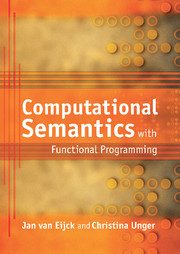Book contents
- Frontmatter
- Contents
- Foreword
- Preface
- 1 Formal Study of Natural Language
- 2 Lambda Calculus, Types, and Functional Programming
- 3 Functional Programming with Haskell
- 4 Formal Syntax for Fragments
- 5 Formal Semantics for Fragments
- 6 Model Checking with Predicate Logic
- 7 The Composition of Meaning in Natural Language
- 8 Extension and Intension
- 9 Parsing
- 10 Handling Relations and Scoping
- 11 Continuation Passing Style Semantics
- 12 Discourse Representation and Context
- 13 Communication as Informative Action
- Afterword
- Bibliography
- Index
8 - Extension and Intension
Published online by Cambridge University Press: 05 June 2012
- Frontmatter
- Contents
- Foreword
- Preface
- 1 Formal Study of Natural Language
- 2 Lambda Calculus, Types, and Functional Programming
- 3 Functional Programming with Haskell
- 4 Formal Syntax for Fragments
- 5 Formal Semantics for Fragments
- 6 Model Checking with Predicate Logic
- 7 The Composition of Meaning in Natural Language
- 8 Extension and Intension
- 9 Parsing
- 10 Handling Relations and Scoping
- 11 Continuation Passing Style Semantics
- 12 Discourse Representation and Context
- 13 Communication as Informative Action
- Afterword
- Bibliography
- Index
Summary
Summary
The semantic treatment we have given up to now consisted of evaluation in a single (predicate logical) model. In this chapter, we will make the distinction between extensional and intensional evaluation. Extension is interpretation in a single model, intension is interpretation across different possible situations. In the preceding chapters we talked about expressions (signifiers) and their interpretations (referents). In this chapter we will discuss a way to make technical sense of the sense or the signified, the concept or idea that an expression invokes in a user of the language. The resulting semantics is called possible world semantics or intensional semantics. It is one of the trademarks of Montague grammar.
Sense and Reference, Intension and Extension
In his paper On Sense and Reference (1892) the German mathematician and philosopher Gottlob Frege made a famous distinction between the sense (German: Sinn) of an expression and its reference (German: Bedeutung). The reference of a name, according to Frege, is the thing that the name refers to. The sense of the name is the thought that allows us to identify the referent. Frege discusses various examples. If a, b, c denote the lines that connect the vertices of a triangle to the midpoints of the opposite sides, then the intersection of a and b coincides with the intersection of b and c.
Information
- Type
- Chapter
- Information
- Computational Semantics with Functional Programming , pp. 183 - 204Publisher: Cambridge University PressPrint publication year: 2010
